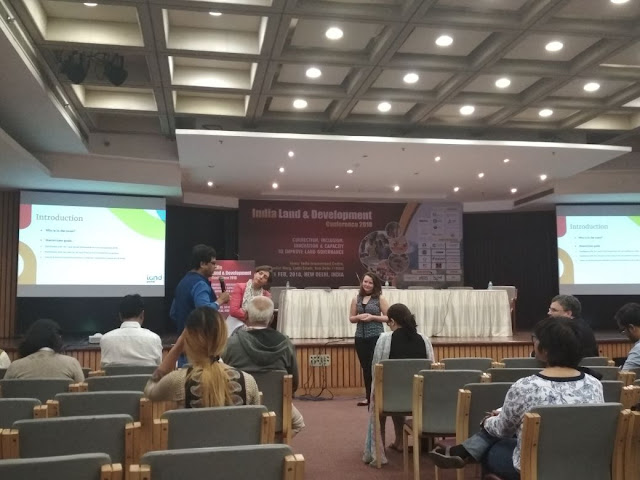 |
| Laura Meggiolaro and Lissette Mey from Land Portal moderating the Master Class on Open Data Awareness |
Laura Meggiolaro and Lissette Mey from Land Portal opened the Master Class as pre-session event at ILDC 2018 to raise awareness on the open data system and the challenges thereof.
Access to information is crucial to achieve
good land governance. Enormous amount of information are published in the web
everyday, yet the issue of accessibility, consistency and reliability still
remain. India being one of the most advanced Open Data Policy in the world, still ranked low in the global Open Data barometer.
Across most countries, data on land are inaccessible.
The reason being, extreme fragmentation and wealth of information, many find it
difficult and time consuming while accessing a particular data from the source.
Land Portal has been working on the theory of change around these lines and
with time, they have managed to overcome these barriers. Land Portal, believed that the solution to these issues in accessing data would be
developing open data for public.
Laura defined Open Data as “The data that can be freely used (modified) and redistributed (shared) by anyone.”
For open knowledge intervention, Land
Portal have outlined FAIR principles for open data system, which narrated as Findable
(easily discoverable on the web), Accessible (available for anyone without barrios
viz. payment/ long in etc.), Inter-operable (needs to be in formats that allow
machines to read and understand) and Re-usable (openly licensed that allows
users to use and build on data and sufficient information about source of
information).
Zooming in on the
concept of interoperability, it is important that machines understands data. Now
that we live in an era of open data, easy availability of data is important. Because
machine can connect data sets and database at a speed and
efficiency much beyond what humans can do. It is the machines that help us establish
an information ecosystem. Thus, Land Portal act as a big repository of data and
procure knowledge from different sources on various aspects of land
development.
Further, in every
step of the Policy Cycle, usage of data is very important, starting from
identifying an issue for addressing the policy, in creating an awareness, in
discussing by creating a dialogue or debate in the political space and in
designing the policy and monitoring. For instance, while monitoring a policy or
a programme, data plays a vital role as it helps to analyse the targets and the
achievements of different indicators.
Another approach is
localization, as local information are underrepresented at the global
information landscape due to the lack of attitude, capacity, technical or legal
issues. Hence, search engines do not show the data sought for. To address this
issue, Land Portal identify local information, building capacities and infrastructures
to cover those invisible information/ institution who do not make investment on
data management. In many cases, various sources show different values of the
same topic, where Land Portal pitch in to harmonizing these data.
India pilot by
NRMC has developed a methodology which could be used as a tool in generating
data. 59% of the data are provided on land and looking at the affordability of
land information. 82.2% of the data are available for free and paid access are for only 6.9%.
Although there are open data available and the government making efforts to
make it more accessible, but there are many constraints since only 10% is
licensed as open data. Everyone publishing data should feel responsible to
publish legally and technically open.
“It needs an attitude in sharing data and one should know how to share data” commented by Pranab. Hence, considering the formats that are readable by machines and using standardized keywords is important as machines do not digest the variations.



No comments:
Post a Comment